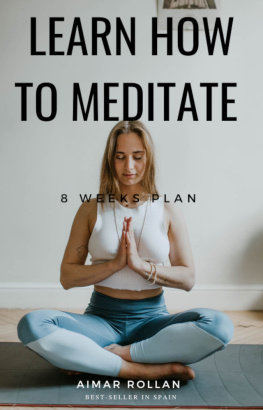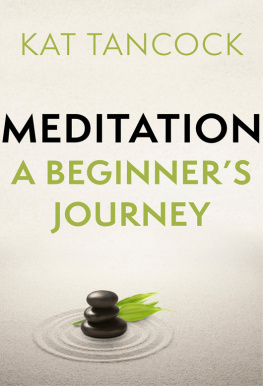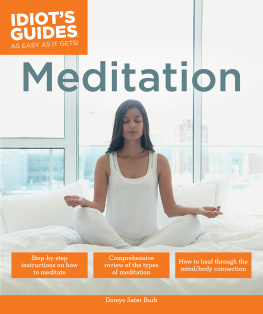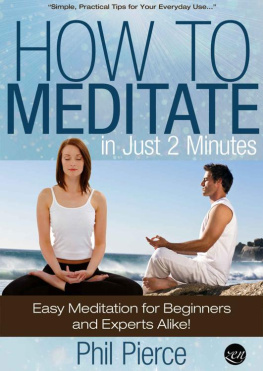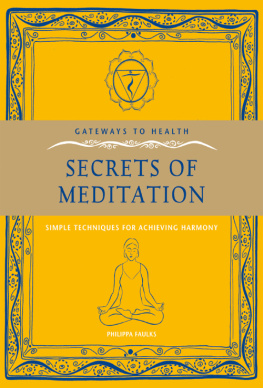Introduction:
Recentlyyou might have heard a lot about meditation from various sources. Why elsewould you buy this book anyway?
Manysuccessful people have vouched for the positive benefits of meditation that hasbrought into their lives. I myself have been largely benefitted by meditation.
AndI want to spread the benefit as much as I can with the way I can do it.
Ican write, so I am writing this book for anyone willing enough to learn thisamazing skill of meditation.
Yes,meditation is a skill. And it can be hard to learn for some people. But oncelearned, it will be helpful to the learner for the rest of their lives.
Theonly reason meditation can be hard to learn is because of our dwindlingattention span in the day and age of social media.
Evenso, with easy techniques provided in this book, it will not be a hard skill tolearn for a long time.
Thisbook is all about meditation. Chances are, if you have bought this book, youalready know a little bit about the benefits of meditation, and you want todive right into the details.
Ihave included a chapter in the beginning where I briefly describe the benefitsof meditation. You can skip that part if you want to.
Iwould not mind really.
Herein this book, I am going to describe different types of meditative techniques.
Inthis book you will get to learn the following meditation techniques:
Body Scan Meditation
Breathing Techniques
Shamatha Meditation
Sitting and Standing Awareness
Superman Focus Technique
Gratefulness Meditation
Walking Meditation
Eating Meditation
Productivity Meditation
Mindful Notifications
Drawing
Brain Dump
Sleep Meditation
You will also get to know a little bitabout Vipassana meditation.
Ihope reading this book is going to help you improve your life.
BeforeI move on from this chapter, I would like to explain the concept ofmindfulness. That is because you will be seeing that word occurring time andtime again here.
Beingmindful means to be aware.
Youcan be aware of anything. Your breath, your environment, the people around you,anything.
Thefollowing is the simplest explanation I can give you about mindfulness. Thereis a chapter dedicated to it. But I think it would be beneficial for you to havea little understanding here.
Mindfulnessmeditation is about concentrating at something, and being aware about it.Sometimes you will be asked to be aware of your breath, sometimes you need tobe aware of your thoughts and so on. You will have clear ideas about eachmeditation techniques as you move on.
Atleast, that is my goal with this book.
Ifyou take away some useful information regarding meditation from reading thisbook, then I will consider myself a success.
Benefits of Meditation:
Youmay already have some ideas about the benefits of meditation.
Thereare so many documented benefits of meditation that it almost seems comical tosome people.
ButI am going to properly explain some science backed benefits of meditation.
Ifyou are not interested in learning about the benefits of meditations and justwant to dive into the techniques; then you can skip this chapter. But I wouldsuggest you to quickly skim through this chapter just for a refresher.
Firstof all, the obvious one. Meditation reduces stress. Regular meditation hasproven to decrease the level of cortisol in your body. Cortisol is also calledby some as the stress hormone of the body. Cortisol is not a bad thingcompletely. It does help out with some bodily functions. But too much of it canincrease the stress and anxiety levels in a person.
Meditationhas been known to help out with regulating cortisol. Which in turn, helps outwith regulating the stress levels.
Therealso has been studies that indicated that, mindfulness meditation actuallyhelps with decreasing depression and symptoms of depression. One study wasconducted in Belgium with middle school students. In the study, some studentswere trained in mindfulness meditation in class and others were not. After asix-month period, the students that were taught the practice of mindfulnessmeditation in class had shown to have lesser number of symptoms that arerelated to depression, stress, anxiety etc.
Inone particular study, it was found that meditation is as effective asantidepressant drugs in treating depression and anxiety. A separate study hasalso proved that meditation helps with reducing the grey matter in the brainwhere stress and anxiety is generated.
Meditativetechniques also help people to train the parts of their brain that can takecontrol of themselves when panic attacks might happen. They can quickly analysethe situation where their brain might indicate them to be in a fight or flightsituation. Meditative techniques can help you getting out of that mentality.
Yousee, the modern human rarely encounters this sort of fight or flightsituations. This was important to men and women when they were living with wildanimals out in the open. They always needed to be alert. There might be snakeshiding somewhere, a lion or a pack of hyenas might be looking for lunch. Inthose situations, staying alert and being in a fight or flight mode was helpfulfor us. That is why humans have survived and evolved as a species.
Butin modern world, nothing life threatening happens on a daily basis.
Justthink about the situations that get us to panic and get agitated. Your bosscalls you for a chat. Worst case scenario, you will be fired. He or she is notgoing to murder you. You do not need to start panicking. At least not acting likehe will kill you. People get panicked when they see that they have missed acall from their spouse/girlfriend/mother etc. that is not a reason of panic.Just call them back.
WhatI am trying to say is that there is no lion hiding in the alley to have you ashis dinner.
So,there is no need to behave like that. But, in most cases, we cannot help butfeel like that. That is why meditation is going to be helpful. With meditation,you will acquire the skill of recognizing your own behavioural pattern. Youwill know where you might start to get panic attacks. That way, you can controlyour own mind when you start feeling the panic attacks incoming.
Italso reduces the risk of cardiovascular diseases and stroke. It also controlsblood pressure.
Meditationalso helps with dealing with pain. As it has been reported that regularmeditators experience less pain when subjected to the same experience withpeople who do not meditate regularly.
Meditationincrease the power to focus and the attention span of meditators. In spite ofdistractions, meditators are able to focus at a task more than others. Ibelieve this to be the most important benefit of meditation.
Studieshave shown that meditating for only 20 minutes everyday has improved thecognitive abilities of the people compared to the people who were notpracticing meditation daily.
Meditationhas also proven to improve resilience, mental strength, decision making,information processing, emotional intelligence, awareness of surroundings etc.it also helps with reducing hyperactivity.
Meditationalso helps with forming new memories and recalling them when needed. Meditationalso helps with nurturing creativity.
Meditationis going to help you to be more empathetic to others. That is going to help youbuild more positive and meaningful relationships with others.
Meditationis also going to increase compassion among meditators.
Withregular meditation, you will feel less worried in social situations, and youmight also feel less lonesome.


